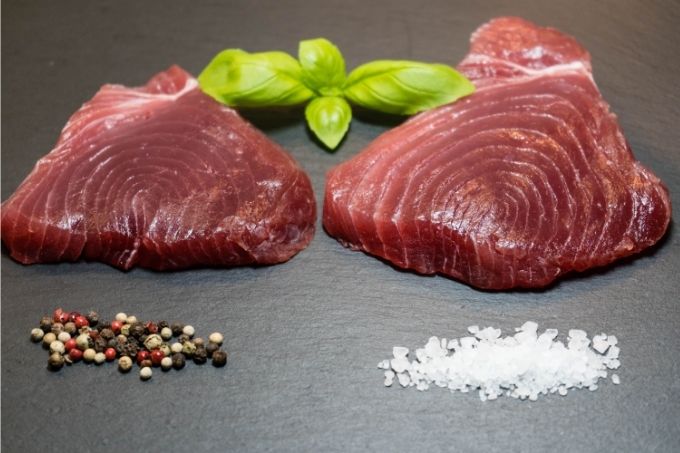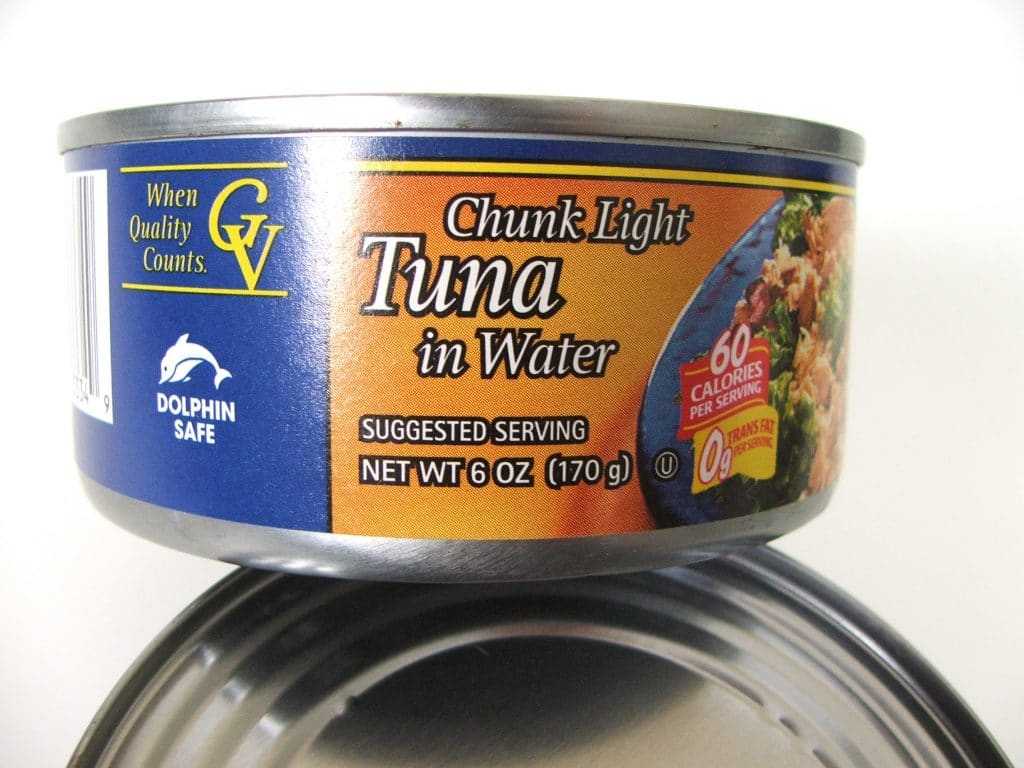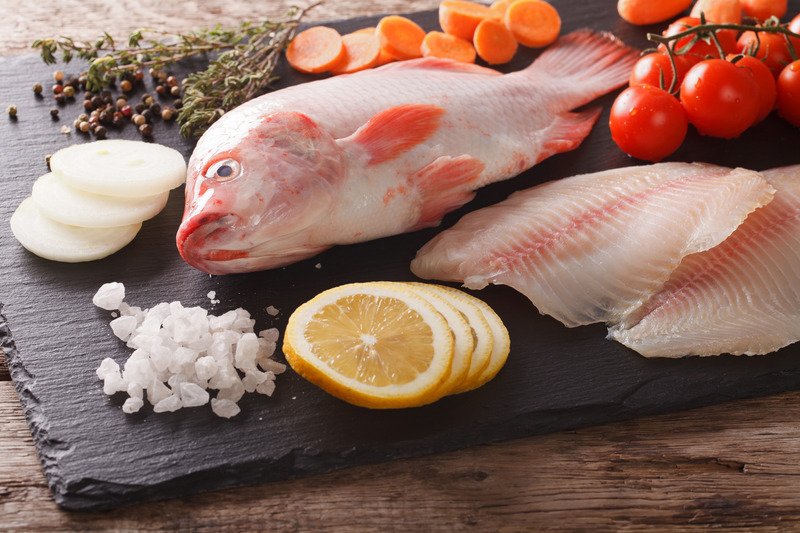Or Dilute Your Favorite Cocktails
Another tip is to make a cocktail with your favorite spirit, such as vodka or rum, and dilute the drink with as much water or non-alcoholic mixer as possible. Create your own spritzer by adding extra club soda, seltzer, and/or lime juice to limit the dehydrating effects of the alcohol. Avoiding alcohol altogether, especially beer, is the best way to avoid a flare of your gout.
Can You Eat Tuna With Gout
Yes! You can still consume tuna even if you have gout or hyperuricemia as long as you limit your intake, select varieties with reduced purine content, and cook it in ways that are safe for those with gout.
Some forms of seafood, such as anchovies, shellfish, sardines, and tuna, contain a higher concentration of purines than others. However, for people who suffer from gout, the potential positive effects of eating fish may exceed the potential negative effects. Fish can be consumed in moderation as part of a diet for gout.
What Kind Of Fish Is High In Purines
The highest concentration of purines in fish is found in sardines. Choose instead other lean protein sources like poultry and pork. If vegetarian, choose dried peas and beans only twice a week due to moderate purine content in legumes. High purine fish include anchovies, cod, herring, haddock, mackerel and sardines.
Don’t Miss: Is Pickle Juice Good For Gout
Best Fish For Arthritis
Adding more marine life to your meals could help calm inflammation.
Arthritis is for the most part a disease of inflammation. When your joints swell, turn red and feel warm to the touch, what youre witnessing and feeling are inflammatory processes in motion.
One way to calm inflammation is with medicine your doctor prescribes. Another way is to add a few keyanti-inflammatory foods to your diet. Among the most potent edible inflammation fighters are essential fatty acids called omega-3s particularly the kinds of fatty acids found in fish.
Omega-3s and Inflammation
Eicosapentaenoic acid and docosahexaenoic acid are called marine fatty acids because they come from fish. What makes these omega-3 sources worthwhile menu additions for people with arthritis is their ability to inhibit inflammation. Omega-3s interfere with immune cells called leukocytes and enzymes known as cytokines, which are both key players in the bodys inflammatory response.
The marine omega-3 fatty acids nip inflammation in the bud before it ignites. They really help to tamp down inflammation in the body on a cellular level, says Kim Larson, a Seattle-based nutritionist and Academy of Nutrition and Dietetics Spokesperson.
Research finds that people who regularly eat fish high in omega-3s are less likely to develop rheumatoid arthritis . And in those who already have the disease, marine omega-3s may help reduce joint swelling and pain.
Which Fish Are Best?
Read Also: Black Cherry Juice For Gout Cvs
What Fish Causes Gout Flare Ups

Some seafood is higher in purines than others. The worst fish for people with gout are anchovies, codfish, haddock, herring, mackerel, mussels, roe , sardines, scallops, and trout. Salmon appears to be an exception and a better choice of seafood for someone with high blood pressure. Salmon is high in omega-3 fatty acids, which are important for heart health.
It is also a good source of protein, calcium, magnesium, iron, zinc, copper, manganese, selenium, thiamine, riboflavin, folate, vitamin B12, niacin and vitamin D. Fish oil supplements are not recommended for anyone with a history of heart disease, high cholesterol, or diabetes. However, they may be helpful for those who are overweight or obese. Fish oil is not a replacement for a healthy diet, but it can help reduce the risk of certain diseases, such as heart attack and stroke.
Read Also: Gout And Tofu
What Type Of Seafood Is Bad For Gout
Purines are higher in some seafood than others. In addition to anchovies, codfish, haddock, herring, mackerel, mussels, roe , sardines, scallops, and trout, gout sufferers are also at risk for heart disease and stroke. Sandon says salmon appears to be an exception and a better choice for people with gout than other seafood options.
Is Tuna Bad For Arthritis
Salmon, tuna, sardines and mackerel These fish are rich in omega-3 fatty acids, which studies have found can decrease inflammation According to the Arthritis Foundation, eating a 3 to 4 ounce serving of these fish two or more times a week is recommended for protecting the heart and reducing inflammation
Read Also: Are Oranges Good For Gout
Is Mackerel Rich In Purines
Rich in purines: anchovies, cod, haddock, herring, mackerel, mussels, sardines, scallops, trout. Average purine content: , lobsters, oysters, shrimp. Meat: Although no longer part of a normal diet in the United States, offal, such as liver, sweet bread, and brain, are the most dangerous for people with gout.
Q Is Salmon Oil Bad For Gout
The higher the uric acid level, the more likely gout flare-ups occur. It is important to find out what raises uric acid, especially when it comes to diet, to go a step further.
Fish like salmon have been heavily discussed sources in terms of uric acid contribution. People tend to associate cold-water fish like salmon as one that may increase your uric acid levels.
Salmon oil has been touted as a beneficial supplement to a healthy diet. It contains anti-inflammatory omega 3 polyunsaturated fatty acids, which may help to reduce gout flare-ups. Fatty acids in this group include salmon, trout, and sardines.
Read Also: Allopurinol Side Effects Alcohol
What Are The Advantages Of A Low
- Reducing uric acid. People who are disposed to hyperuricemia may be able to manage their condition with diet to prevent complications such as gout and kidney stones from developing. People who have already been diagnosed with gout or kidney stones may be able to prevent new uric acid crystals from forming in their joints or kidneys or at least slow the process down.
- Reducing weight. Avoiding high-purine foods such as red meats and sweets may help you reduce weight as a secondary benefit. Gout is highly associated with excess weight gain and related metabolic syndromes such as obesity, diabetes and cardiovascular disease. Weight loss statistically lowers your risk of developing gout, and it helps relieve symptoms of gout by taking stress off your joints.
- Reducing medication. Diet is not as effective as medication for managing gout, and its not supposed to replace it. But paying attention to your diet may help minimize your need for medications.
Canned Tuna Effects For Gout
There is a well-known connection between canned tuna and gout. Despite the numerous benefits of tuna, the canned variety also has high amounts of purines the most common issue associated with gout flareups. Canned tuna has almost 120mg of purines for 100g of food.
Canned tuna comes in more varieties. If you do want to have tuna every once in a while, stick to light canned tuna such as skip jack. You can have a couple of small servings a week. A serving should not exceed four ounces about the size of your palm. To help you get an idea about it, the daily intake of purines to have without triggering gout should not exceed 400mg.
Recommended Reading: Almond Milk And Gout
The Connection Between Tuna And Gout
Gout is caused by too many purines in the body and lots of fish and seafood are high in purines unfortunately, tuna makes no exception. High amounts of purines can cause high levels of uric acid, which will inevitably trigger gout attacks. Whether you suffer from gout or various kidney affections, having too much tuna in your diet will inevitably cause hyperuricemia high blood uric acid levels and lead to multiple complications.
Sneaky Gout Triggers: Yeast Extract Msg Fructose Sauces

Yeast extract and MSGâYeast extract plus other additives is basically MSG . MSG powder contains purines that immediately metabolizes to uric acid. Although there is proof linking yeast to purine content via alcoholic beverages, only a few sources warn yeast extract as a high-risk gout trigger.
MSG and yeast extract are flavor-enhancers in several products such as processed meat, canned food, bouillon, sauces, soup mixes, gravies, and salad dressings. Since the ingredient percentages are not typically listed or shared, it is very risky for people with chronic gout .
Manufactures will camouflage MSG by listing these these sub-ingredients instead of yeast extract, protein isolate, hydrolyzed vegetable protein, hydrolyzed yeast, and soy extracts.
MSG is not only associated with gout. It is also linked to other health problems and allergies. Known side effects from MSG overconsumption are heart palpitations, headaches, numbness and drowsiness.
Fructose â Even though there is plenty of evidence that fructose causes the body to produce purines, most major sources did not account for it as a major gout trigger. Research from 2016 linked fructose consumption to increased uric acid levels which leads to gout flares.
Sauces â Popular sauces that may cause or contain purines are fish sauce, worcestershire sauce , oyster sauce, barbecue sauce , and Maggi seasoning .
Read Also: Is Onion Bad For Gout
Canned Tuna: Nutrition Facts
According to the U.S. Department of Agriculture, the nutritional value of 1 can of light tuna packed in water and drained is as follows:
- Calories: 191
- Potassium: 408mg
- Sodium: 648mg
Canned tuna contains high purine content, however, and purine intake has been shown to have the biggest dietary impact on uric acid levels in the body. Fresh tuna has approximately 157.4 mg of total purines per 100 g. Canned tuna has 116.9 mg per 100 g.
If you want to eat tuna, be careful about the amount and type of tuna you eat.
The U.S. Food and Drug Administration recommends choosing canned, light tuna varieties, including skipjack. You can safely consume two to three servings per week. Keep in mind that a serving size is a 4-ounce portion, or about the size of your palm. The daily intake of dietary purines recommended in Japan for preventing gout and hyperuricemia is less than 400 mg.
Does Fish Belong In A Gout Diet
You often read on other websites that if you suffer from gout you should avoid eating fish since it is considered high in purines. In this post we will examine this issue and take a closer look and see if fish does belong in a gout diet. First of all fish has been consumed by humans for thousands of years and is we all know it is very healthy for you. Lets see some of the health benefits that fish provides.
Fish is loaded with nutrients and is considered on the healthiest foods in the world. It is high in protein, vitamin D and is considered the best source for omega-3 fatty acids which is linked to reducing the risk of developing many diseases.
Omega-3 fatty acids also helps keep your brain working well reducing the risk of developing dementia or Alzheimers. Many studies prove that if you eat fish on a weekly basis, you will experience a slower rate of cognitive decline.
Fish also is good for the heart, in fact it is considered one of the best foods to eat in order to have a healthy heart. Again many studies prove that eating fish regularly is good for the heart in order to avoid a heart attack or stroke. Gout sufferers should take note since we are at a higher risk of developing a heart attack or stroke.
Did you know that fish is also high in vitamin D? A single 4 ounce serving of cooked salmon contains 100% of recommended intake of vitamin D. For more information on important vitamin D is to gout sufferers make sure to read my post titled Gout and Vitamin D.
Also Check: Almonds Good For Gout
Foods You Can Eat Eat In Moderation Or Avoid
Foods that should be completely avoided are mainly simple carbohydrates , red meat, organ meat and seafood.
It is important to increase your intake of fruits, vegetables, healthy fats and whole grains, as outlined below:
|
Allowed |
|
|---|---|
|
Natural fruit juices |
Seafood, like crab, shrimp, muscles, and caviar |
Food that can be consumed in moderation, like chicken, red meat and eggs, may need to be eliminated from the diet temporarily, when uric acid levels are very high or if you are experiencing a gout crisis.
Although tomatoes are not recommended as they are associated with higher uric acid levels, there are no studies to confirm this relation. Tomatoes are a healthy food that is rich in vitamin C and antioxidants, which help to regular uric acid levels. Therefore, people who do not experience worsening of symptoms with tomatoes can continue to eat them.
Another myth is that citric fruit can make blood more acidic and contribute to high uric acid levels. However, fruit acid is neutralized by stomach acid which is much stronger in comparison. Although they are absorbed into the blood, acid from citric fruits do not influence blood pH and do not worsen uric acid levels.
Will Salmon Cause Gout
4,230
Gout is very painful, so its natural for people to wonder if they can still eat certain seafood after being diagnosed with gout. We certainly recommend speaking to your physician about your diet if you have arthritis or gout, as diet can cause issues with your joints.
As a person ages, flare-ups of gout can become more severe, leading to much worse instances. If you are tired of downing painkillers and would like a more natural approach to moderating flare-ups of your gout, read todays robust discussion on purines, gout, and seafood.
Is Salmon High in Purines?
Salmon is not as high in purines compared to other types of fish. On average, salmon provides 170 mg of purines for every 100 grams. Other fish that are OK to consume in controlled amounts because of their moderate purine content are haddock, halibut, herring roe, Atlantic herring, Matje cured herring, pike-perch, and mackerel. However, keep in mind that their physicians will likely dissuade those with severe gout from eating even these fish.
There might be some debates about whether you should be consuming seafood at all when you have gout, but we have to take into account the gentle balancing act that occurs when we choose to eat food.
Purines occur naturally in the food that we eat. These are compounds that are eventually metabolized and transformed into uric acid. Purines are constituted by oxygen and nitrogen.
Is It OK to Eat Salmon If You Have Gout?
What Causes Gout?
Read Also: Almonds And Gout
Don’t Miss: Are Onions High In Purines
What Are The Disadvantages Of A Low
- Its limiting. For people with hyperuricemia, a low-purine diet is a long-term lifestyle change. It also happens to target many favorite indulgences, including sugar, sweets and alcohol. For some people, giving these up indefinitely may seem unrealistic, especially when its only a complementary therapy. Like most diets, you do have to stick to it to reap the benefits.
- It limits omega-3 sources. Seafood is among the most important dietary sources of omega-3 fatty acids, and the low-purine diet limits many of these. Omega-3s have many known health benefits in particular, alleviating inflammation and joint pain from arthritis. Many Americans dont get enough omega-3s, and limiting seafood can make it even harder. However, fish-oil supplements are ok on this diet. Salmon, sardines and mackerel are also good sources and relatively low in purines.
- Its not a cure. Diet may move the needle a little on uric acid levels in your blood, but not as much as medications do. The best approach is to combine them. Some people argue that the benefits of the diet arent proven to be worth the trouble when compared with medication. But medication alone is often not enough to manage gout effectively. In these cases, many people appreciate having something they can do proactively to reduce their symptoms.
A note from Cleveland Clinic
Does Canned Tuna Fish Cause Gout
But, remember that canned tuna consists of high levels of sodium. Although salt is low in purines, those with gout should select the foods with less salt.
So it is also essential for overall good health. Canned tuna should be consumed in limited quantity, as it has a moderately high content of purines.
Although high in purines, tuna is known to offer a number of dietary benefits. It is a rich source of omega-3 fatty acids, which is beneficial for cardiovascular health.
Omega-3 fatty acids found in tuna also help to reduce the risk of stroke, diabetes, ulcerative colitis, asthma, and some types of cancers.
You May Like: Are Almonds High In Purines
Q Is Salmon Omega 3 Good For Uric Acid
Yes, omega 3 fatty acids are vital fatty acids that must be consumed in food or supplementation. Essential fat like omega 3 from fish like salmon reduces inflammation and swelling.
When shopping for fish, choose smaller types as they contain less mercury and purines. Try salmon sardines and mackerel. To reduce inflammation, eat a serving of 2 to 3 times a week. One serving is equivalent to 4 ounces.
If you prefer omega 3 supplements, you can take up to 2.6 grams twice a day. Check on the ingredients list to ensure it contains 30 percent eicosapentaenoic acid and docosahexaenoic acid .
If you take inflammatory drugs, you should talk to your doctor first before taking salmon oil supplements.
Instead Of Gravies And Sauces Use Vegetable Broth Or Dairy

Since they are made with the fat and drippings from meat and poultry, gravies and sauces made from beef, pork, and poultry should be avoided because they contain high amounts of purine. Try making sauces with vegetable broth or tomato sauce. Dairy-based sauces, such as a low-fat cream sauce, are also safe alternatives.
Read Also: Onion And Gout